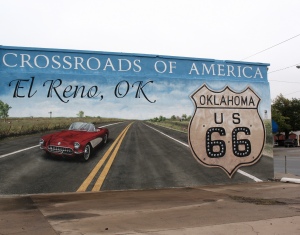
May 25, 2011
Tornado alley was impacted again on Tuesday, May 24, 2011.

Much of the damage Tuesday came from one large tornado that touched down north of Lookeba in Caddo County and moved northeast into Canadian County, where it killed people on I-40 and destroyed homes and businesses west and north of El Reno, Oklahoma. The twister destroyed more homes in the Piedmont area and caused serious injuries before it moved into southeastern Kingfisher County, damaging homes south of Cashion, and continued into Logan County, causing more damage. The storm continued to cause damage into Payne County near Stillwater. Jerry Smith, Canadian County emergency management director, said numerous injuries were reported along I-40 near El Reno. A gas line explosion also was reported in El Reno. Tom and Carla Chronister took cover at their business, Festivities in El Reno. They went home after the storm cleared and found their house on North Highway 81 in ruins. “It took everything far, far away,” Tom Chronister told a reporter at NewsOK.
In the news today, due to a tornado strike, El Reno is historically significant in cryptozoology, for it is a town that has a place in the “southern ape” archives. It was there an amazing find was made that was forever made silly by the mere use of a media-inflicted name. Can a silly name for a cryptid incident make us ignore it? What has been the impact on a significant find due to how it was initially labeled? Probably because of its name, you have never seriously considered what was found there. Let us revisit that piece of the evidence, the matter of the El Reno Ape Prints, today.
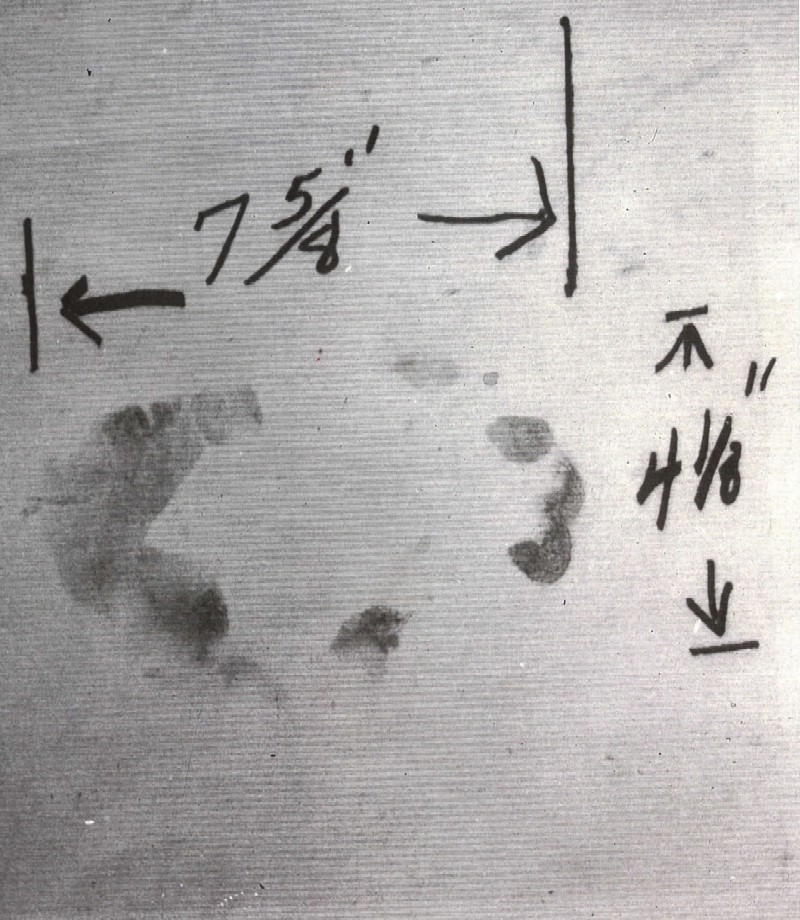
Dr. Grover Krantz did not bring to the attention of hominology the possible importance of dermal ridges found in Pacific Northwest unknown hominoid footprint casts until 1982. But years earlier, in the South, “fingerprints” were quite visible in this find from El Reno. I wrote in two of my books (in 1978 and 1983), about the discovery and photographic record of dermals from a version of unknown anthropoid found a dozen years before 1982.
“Handprints” or “footprints” resembling those made by a chimpanzee- or gorilla-like human or a human-like great ape are part of the question of unknown anthropoid cryptids in the southern United States.
Near El Reno, Oklahoma, in December 1970, something which moved on all fours raided a chicken coop, leaving a handprint on the door. Local media called it the “El Reno Chicken Man.”
The door and the 7″ x 5″ handprint were taken to Lawrence Curtis, Director of the Oklahoma City Zoo, for an opinion. I exchanged correspondence on the matter with the zoo director. Curtis told me he was frankly baffled. He found the thumb of the print quite unusual – it was crooked as if deformed or injured. Curtis thought it was from a primate but was uncertain of what kind. I interviewed and asked the anthropologist Carleton Coon about the print, as well. He felt it was definitely made by a higher primate.
In my files, I had collected reports from over a three-year period in the same general area – a mere 16 miles away, from 1967-70, of a Howard Dreeson of Calumet, Oklahoma, who left out bananas and oranges for an animal he described as a “chimpanzee.” He had hoped to capture it. He never did.
An examination of the photograph of the El Reno “handprint” left on the chicken coop door shows not so much a deformed hand as a typical anthropoid footprint. In a good quality reprint of the photograph, dermal ridges are slightly visible.
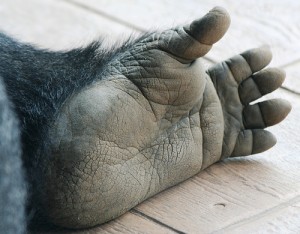
Gorilla foot.
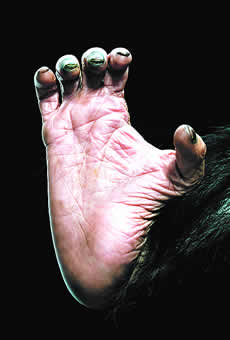
Chimpanzee foot.
Sources: Creatures of the Outer Edge (first published 1978, reprinted 2006); Mysterious America (first published 1983, reprinted 2007). The photo of the El Reno Ape Print was first published in the 1983 edition of Mysterious America.
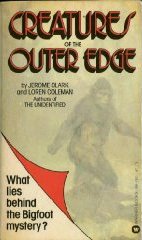
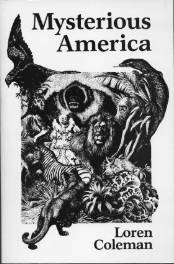
About Loren Coleman
Loren Coleman is one of the world’s leading cryptozoologists, some say “the” leading living cryptozoologist. Certainly, he is acknowledged as the current living American researcher and writer who has most popularized cryptozoology in the late 20th and early 21st centuries.
Starting his fieldwork and investigations in 1960, after traveling and trekking extensively in pursuit of cryptozoological mysteries, Coleman began writing to share his experiences in 1969. An honorary member of Ivan T. Sanderson’s Society for the Investigation of the Unexplained in the 1970s, Coleman has been bestowed with similar honorary memberships of the North Idaho College Cryptozoology Club in 1983, and in subsequent years, that of the British Columbia Scientific Cryptozoology Club, CryptoSafari International, and other international organizations. He was also a Life Member and Benefactor of the International Society of Cryptozoology (now-defunct).
Loren Coleman’s daily blog, as a member of the Cryptomundo Team, served as an ongoing avenue of communication for the ever-growing body of cryptozoo news from 2005 through 2013. He returned as an infrequent contributor beginning Halloween week of 2015.
Coleman is the founder in 2003, and current director of the International Cryptozoology Museum in Portland, Maine.
Filed under Breaking News, Cryptomundo Exclusive, CryptoZoo News, Cryptozoology, Footprint Evidence, Forensic Science, Skunk Apes, Swamp Monsters